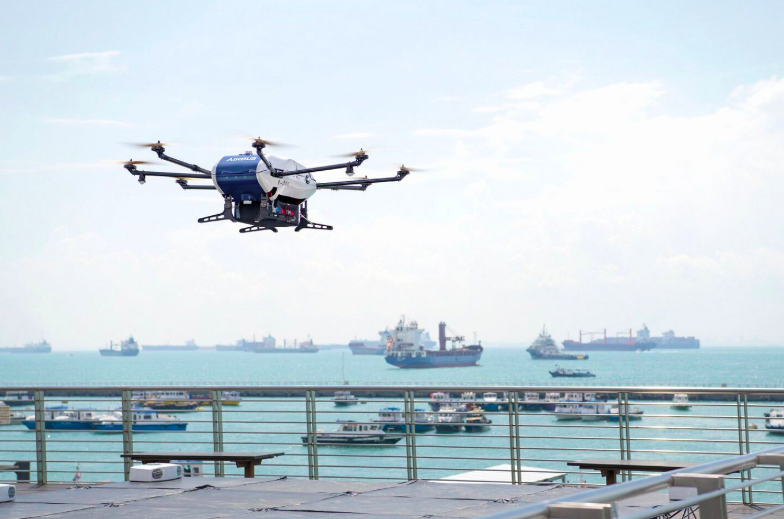Airbus Shore-to-Ship Drone May Be Wave of the Future

Airbus’ shore-to-ship delivery trials, in real port conditions using the aerospace company’s Skyways drone, are proving that drone technology has the potential to revolutionize parcel-delivery services.
The company last year performed the world’s first shore-to-ship parcel delivery using a Skyways drone. It carried a 1.5-kg cargo load of 3-D-printed consumables from Marina South Pier in Singapore to a ship deck 1.5 km offshore.
Further trials have been performed with a 4-kg-payload Skyways drone, which navigated autonomously along predetermined aerial corridors to vessels up to 3 km from the coast, says Airbus. Collaborating on this trial were the Civil Aviation Authority of Singapore (CAAS) and Wilhelmsen Ships Service, an international maritime logistics company. Airbus Skyways is touting up to 90% savings in delivery costs and up to six times higher delivery speeds than what is currently possible with launch boats. The use of drones in the maritime industry can significantly reduce the risks of cumbersome launch-boat deliveries, which have higher accident rates, greater manpower requirements and a larger environmental impact, says Airbus.
Airbus Skyways’ choice of partner country was no surprise, as Singapore has one of the world’s busiest ports and high manpower costs, so unmanned drones can make a significant commercial impact. But performing the delivery trials in Singapore is also strategic, as they are conducted in collaboration with the CAAS. Demonstrating the drone deliveries under the watch of the civil aviation safety regulator opens the possibility of aiming for longer, heavier, and more complex deliveries.
The Skyways project in Singapore goes back several years, when it was first employed on a small scale with Singapore Post at the National University of Singapore (NUS) in 2016. Back then, the concept for drone delivery was that parcels could be entered into designated stations, before being automatically loaded onto drones, which flew to other stations via aerial corridors, Airbus says.
Airbus also says it is continuing to work with NUS to develop other use cases for autonomous parcel delivery in dense urban environments.
But shore-to-ship parcel delivery demonstrates the ability to overcome further challenges, such as how to ensure there is enough redundancy in the systems for safety in long-distance flying. It also demonstrates a practical application for drone technology in a specific industry.
Wilhelmsen Ships Service says it sees the possibility of using the drones to deliver time-critical documents, medical supplies and small spare parts.